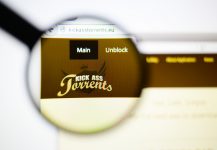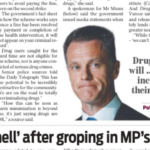Village Roadshow to Sue Illegal Downloaders

Are you amongst the 29% of Aussies over the age 18 who regularly download content through illegal means?
If so, you could soon be facing legal action from one of Australia’s largest media conglomerates, Village Roadshow.
In an interview earlier this week, co-founder and CEO Graham Burke promised to crack down on pirates, saying, ‘It’s wrong. [Illegal downloaders] have been warned, notices issued, that they have been doing the wrong thing. Yes, we will sue people.’
Burke is unfazed by the prospect of negative publicity, which has emerged following previous attempts by media companies to combat piracy, stating, ‘We’re certainly not going to be seeking out single pregnant mothers.’
And companies like Village Roadshow could now be aided by new legislative reforms which give them greater power to stop pirates in their tracks.
Dallas Buyers Club Slammed by Federal Court Ruling
Just weeks ago, rights holder Dallas Buyers Club LLC was hit hard by a Federal Court ruling requiring the company to lodge a $600,000 bond in order to access downloader details.
The film Dallas Buyers Club is said to have been downloaded illegally by thousands of Australians. As previously reported, Dallas Buyer Cub LLC has been engaged in a long-running Federal Court dispute with internet service providers (ISPs) including iiNet, Internode, Dodo, Amnet and Adam Internet.
In April this year, Justice Perram ordered that the ISPs hand over the names and addresses of customers who had allegedly downloaded the film, which was seen as a massive win for Dallas Buyers Cub LLC. This would enable the company to send out letters to alleged pirates threatening legal action if they did not pay specified sums of money for the loss caused.
But the Court also imposed privacy restrictions on this information in order to protect the identities of those involved – and further ordered Dallas Buyers Club LLC to submit a draft of the letter it proposed to send out to alleged infringers.
On August 14, Justice Perram stated that he had reviewed and rejected several ‘aggressive letters’ which proposed to charge pirates exorbitant licensing fees for downloading movies other than Dallas Buyers Club. He refused to disclose the exact amounts that the company was seeking, but stated:
‘The idea that DBC’s damages should equal the value of what was taken from it without its permission is not, self-evidently, a ridiculous claim and, indeed, has a certain biblical charm.’
Justice Perram then ordered that the company must lodge a $600,000 bond in order to access downloader’s details, saying that such a move was necessary to protect individuals in the event that DBC breached Court orders.
Rights Holders Unite
Despite the bad news for Dallas Buyers Club LLC, rights holders are putting up a good fight in their bid to end piracy.
In April this year, rights holders submitted the Copyright Notice Scheme Code 2015 to the Australian Communications and Media Authority (ACMA). The Code will come into effect on the 1st of September 2015, and will allow rights holders to issue infringement notices to individuals who are alleged to have taken part in illegal downloading.
The notices will not allow rights holders to seek damages from pirates – but are ‘designed to change their behaviour and help steer them toward lawful sources of content.’
The law will also require ISPs to assist rights holders in a preliminary discovery process so that they can ‘take legal action against persistent infringers.’
Individuals who receive three or more infringement notices in the space of 12 months will have the allegations independently reviewed.
The Copyright Amendment Bill
In a further attempt to assist rights holders, the government has proposed new legislative reforms.
The Copyright Amendment (Online Infringement) Bill was passed by both houses of parliament in July this year, and is expected to come into effect in coming months.
In his Parliamentary address, Communications Minister Malcolm Turnbull said:
‘It has become apparent that there is a gap in Australia’s legislative framework insofar as existing copyright law is not adequate to deter a specific type of infringing activity.’’
The Bill would allow rights holders to directly approach the Federal Court for an injunction forcing Carriage Service Providers (CSPs) to block access to pirating websites, such as Kickass Torrents and The Pirate Bay.
Importantly, rights holders would not have to prove that the CSP was liable for copyright infringement or that it had authorised copyright infringement before an injunction could be granted.
In determining whether to grant an injunction, the Federal Court would consider various factors including:
1. The flagrancy of the infringement or its facilitation;
2. Whether disabling access to the online location is a proportionate response in the circumstances;
3. The impact on any person likely to be affected by the grant of the injunction, and
4. Whether it is in the public interest to disable access to the online location.
The Bill has been backed by companies such as Village Roadshow, which has reportedly donated around $4 million to major political parties since 1998.






